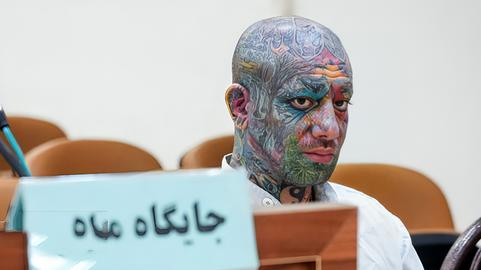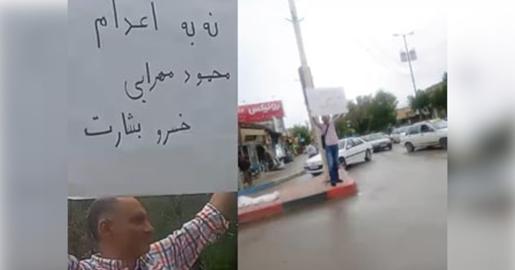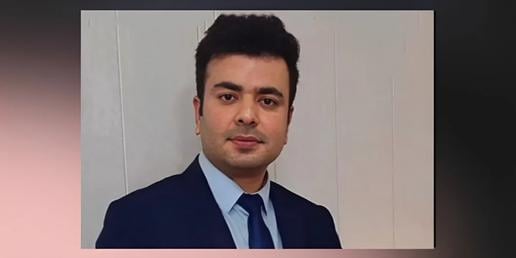Mohammad Ghouchani spent over 150 days in detention for his work as a journalist. Throughout his career, he set up and worked on a number of publications, and authorities repeatedly closed them down. Nonetheless, he continues his journalistic activities. In 2009, he was charged with “activities against national security.”
Name: Mohammad Ghouchani
Born: 1976, Rasht, Iran
Background: Journalist and writer; editor-in-chief of Ham Mihan, Aseman, Tajrobeh, Mehr Nameh, Shargh, Seda Weekly and Mardom-e Emrouz newspaper.
Charges: Activities against national security.
Mohammad Ghouchani began working as a journalist and film critic for local newspapers in Rasht in 1997, the capital of the northern province of Gilan. In 1998, he moved to Tehran to study political science at the University of Tehran. At the same time, he wrote for several newspapers and made a name for himself by being critical of a number of hardliner politicians. In 2000, he was arrested for “spreading rumors” and “insulting the sacred” and spent 36 days in detention.
In 2001, Ghouchani was appointed as the editor-in-chief of Hamshahri Monthly, the cultural supplement to the high-circulation newspaper Hamshahri. Soon after, the judiciary banned the paper. After this, he and a group of young journalists founded Shargh and Ham Mihan newspapers, which were also temporarily banned in 2006. Ghouchani reacted by founding a new magazine, Shahrvand-e Emrouz.
In the run-up to the disputed presidential elections of 2009, he was the editor-in-chief of Etemad-e Melli newspaper, which supported the reformist candidate Mehdi Karroubi.
At 2am on the morning of June 20, 2009, during the unrest that followed the presidential election, Intelligence Ministry agents knocked on Ghouchani’s door and arrested him and his wife Maryam Baghi. They did not have an arrest warrant.
On two occasions, Ghouchani appeared in court with several other detainees who had also been detained during the wave of post-election arrests. Although he was not formally charged, authorities took him away. He spent 131 days in detention before being released on October 30.
Most recently, Ghouchani was the editor-in-chief of the newspaper Mardom-e Emrouz, which was shut down on January 17, 2015 after just 19 issues. The final issue ran a front-page story on remarks George Clooney made in support of the journalists who were killed during the terrorist attack on the French satirical magazine Charlie Hebdo in January 2015.
Kayhan newspaper, which operates under the supervision of the Supreme Leader, called on the judiciary to prosecute the publication. “If in France the open or hidden dominance of Zionist criminals encouraged Charlie Hebdo cartoonists to insult the sacred realm of the Prophet, what has caused the astonishing negligence and silence of judicial officials and those who are asleep at the Ministry of Culture and Islamic Guidance when obscene publications have added their voice to the infidels and enemies of the Prophet?” the paper asked. “Under what justification are the lackeys of the ‘ideological war’ able to freely spread hate and promote disrespect for the Prophet of Islam in the capital of Islamic Iran, especially since these people’s pasts are known to everybody?”
In response to the criticism, Mardom-e Emrouz said, “Publishing the statements by George Clooney was meant to express solidarity with the victims and oppose terrorism, not to show approval of any insults. Of course, the atmosphere has changed since the publishing of the latest issue [of Charlie Hebdo. The cover featured an image of the Prophet Muhammad].” Mardom-e Emrouz was closed regardless.
After 70 hardliner parliamentarians called on the Minister of Islamic Culture and Guidance to take decisive action against Mardom-e Emrouz, the newspaper’s permit was also revoked. But this did not fully satisfy hardliners.
On January 23, the Iranian media reported that repeatedly insulting the Islamic Republic would result in a permanent ban under new emergency legislation presented to parliament.
The MP Hamid Rasaei, who sat on the committee that drafted the emergency law, told Tasnim news agency that journalists could face a lifetime ban for violating the “sanctity” of Iranian society and its values and that newspapers and other media outlets would be permanently closed if they continued to ignore these guidelines.
Rasaei said that there were safeguards like this in place to protect the values of the Islamic Republic in other industries, such as food manufacturing and pharmaceutical companies. “But in the domain of culture, authorities don’t show the same sensitivity and awareness,” he said. If an editor-in-chief insisted on repeatedly publishing offensive material, he or she should “not be allowed to work in the sector.”
The conservative website Raja News responded to the announcement: “The banning of Mardom-e Emrooz is only the first step. We thank the judicial authorities for their swift action. Those running this newspaper should face serious consequences.”
Read other cases in the series:





















comments